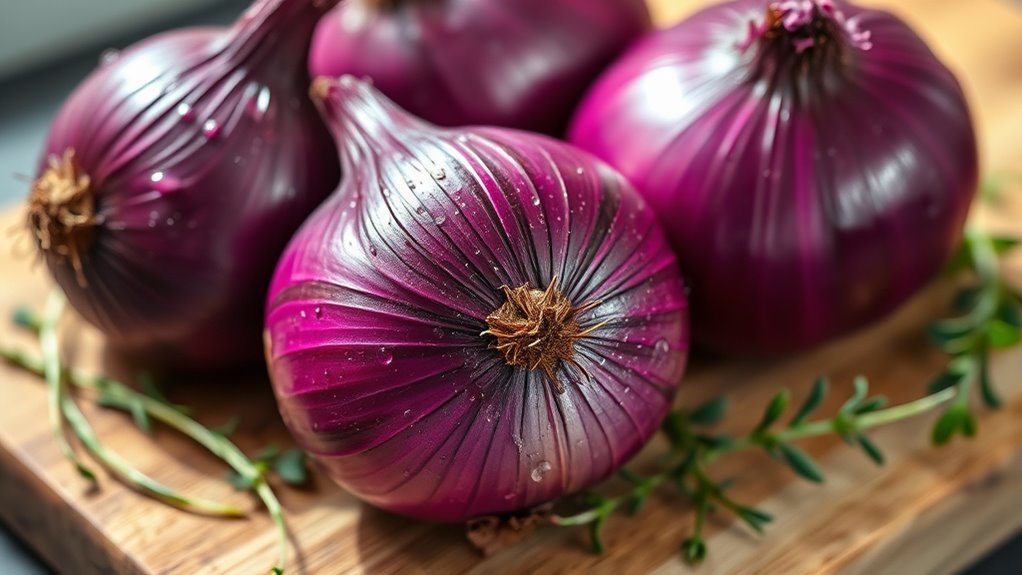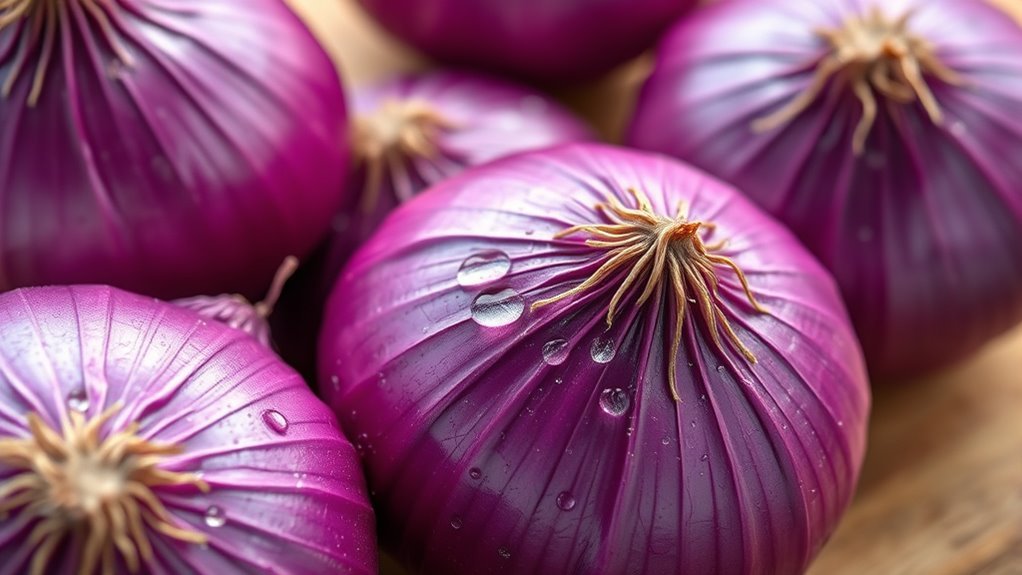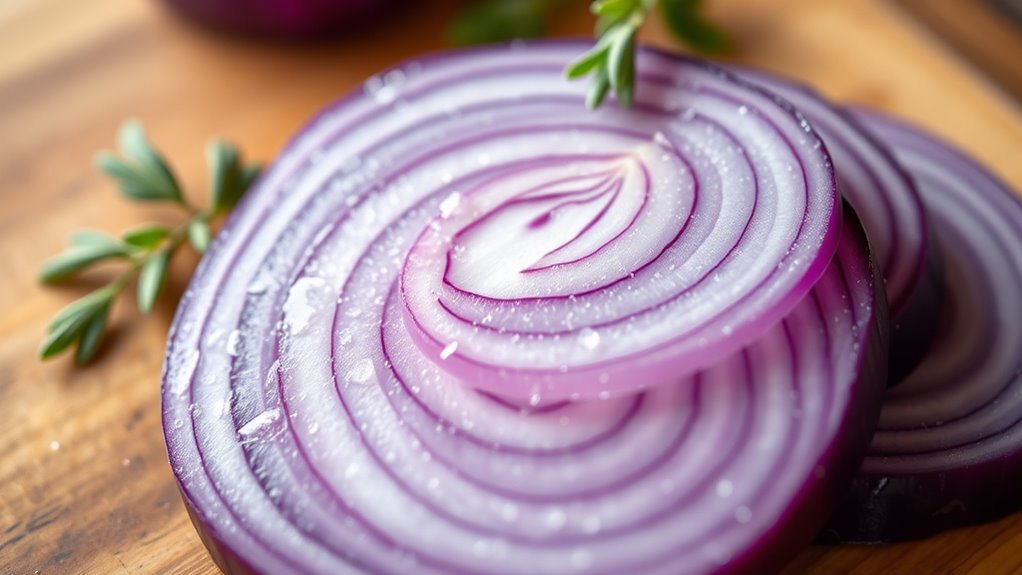Yes, purple onions are keto-friendly! With about 7 grams of carbohydrates per typical serving, they can be enjoyed in moderation on a low-carb diet. They’re low in calories and high in essential vitamins and antioxidants, making them a nutritious choice. You can add them to salads, soups, or sautéed dishes to enhance flavor without greatly impacting your carb count. To discover more about their health benefits and how to incorporate them, keep exploring!
Nutritional Profile of Purple Onions

When you consider adding purple onions to your keto-friendly meals, it’s essential to understand their nutritional profile. Purple onions are low in calories and pack a punch when it comes to vitamins and minerals. They’re rich in vitamin C, which supports your immune system and skin health. Additionally, they contain B vitamins like B6 and folate, which play significant roles in energy metabolism and cell function. The antioxidants found in purple onions, including quercetin, can help reduce inflammation and combat oxidative stress. While they may be slightly higher in carbohydrates than other non-starchy vegetables, their health benefits make them a valuable addition to your meals. Embracing purple onions can enhance flavor and nutritional value, giving you the freedom to explore diverse dishes.
Carb Content and Ketogenic Compatibility

When considering purple onions for a ketogenic diet, it’s important to look at their carb content relative to your daily intake goals. A typical serving size of purple onions contains about 7 grams of carbohydrates, which can impact your overall carb count. Understanding this nutritional profile helps guarantee you stay within your keto guidelines while enjoying their flavor.
Nutritional Profile Overview
Purple onions, often celebrated for their vibrant color and robust flavor, also come with a unique nutritional profile that can be relevant for those following a ketogenic diet. Generally, purple onion varieties contain about 9-10 grams of carbohydrates per 100 grams, which may be a concern for strict keto adherents. However, their potent onion flavor profiles allow for smaller quantities to enhance dishes without greatly impacting your carb intake. When used wisely, they can add depth and taste to your meals while still fitting into a low-carb lifestyle. Additionally, they’re rich in vitamins and antioxidants, offering health benefits that complement their culinary uses. So, while moderation is key, purple onions can still have a place in your keto journey.
Serving Size Considerations
While purple onions can certainly enhance the flavor of your dishes, it’s essential to pay attention to serving sizes, especially on a ketogenic diet. A typical serving size of purple onion is about 1/4 cup, which contains approximately 4 grams of net carbs. If you’re monitoring your carb intake, practicing portion control is vital. Consider using purple onions as a flavor booster rather than a main ingredient; this way, you can enjoy their taste without overloading on carbs. For serving suggestions, try adding small amounts to salads or as a topping on keto-friendly burgers. Balancing your onion intake with other low-carb vegetables can help maintain your ketogenic compatibility while still savoring the vibrant taste they provide.
Health Benefits of Purple Onions

Purple onions are packed with essential nutrients, making them a smart addition to your diet. They’re rich in antioxidants, which help combat oxidative stress and may reduce inflammation in your body. By incorporating purple onions into your meals, you can boost your overall health while keeping your keto plan on track.
Nutrient Density Benefits
When you incorporate purple onions into your diet, you’re not just adding flavor; you’re also boosting your nutrient intake considerably. Their impressive nutrient density contributes to health optimization, making them a smart addition to any meal plan. Here are four key benefits:
- Rich in Vitamins: They’re a great source of vitamin C, essential for immune function.
- High in Fiber: This supports digestive health and can aid in weight management.
- Low in Calories: You can enjoy them without worrying about excess calories.
- Contains B Vitamins: These are vital for energy metabolism and overall well-being.
Antioxidant Properties Explained
Antioxidants play an essential role in protecting your body from oxidative stress, and purple onions are packed with these powerful compounds. These antioxidant compounds, such as quercetin and anthocyanins, help combat free radicals, which can lead to cellular damage and chronic diseases. By incorporating purple onions into your diet, you can experience notable health benefits, including reduced inflammation and improved heart health. Quercetin, in particular, has been shown to lower blood pressure and enhance immune function. Plus, the vibrant color of purple onions indicates their high antioxidant content, making them a smart choice for health-conscious individuals. So, enjoy the crisp, flavorful addition of purple onions to your meals, and reap the rewards of their impressive antioxidant properties.
Incorporating Purple Onions Into a Keto Diet
While many people associate onions with higher carbohydrate content, incorporating purple onions into a keto diet can be both flavorful and beneficial. These onions not only add color to your meals but also enhance their taste without a substantial carb load. Here are some ideas for using purple onions in your keto meal prepping:
Incorporate purple onions into your keto meals for vibrant flavor and minimal carbs.
- Salads: Thinly slice purple onions to add a zing to your fresh salads.
- Sautéed Dishes: Caramelize them to enrich the flavor of your stir-fries or sautéed vegetables.
- Soups: Incorporate them into low-carb soups for added depth.
- Onion Substitutes: Use purple onions in place of other varieties for a unique twist in your dishes.
Embrace the freedom of flavor with purple onions while staying on track with your keto goals!
Comparison With Other Onion Varieties
Although purple onions are often celebrated for their vibrant color and sweet flavor, they differ markedly from other onion varieties regarding taste, texture, and nutritional profile. For instance, yellow onions have a stronger, more pungent flavor, making them ideal for cooking. Conversely, white onions offer a sharper taste that can enhance dishes like salsas. When you compare these onion flavor profiles to purple onion varieties, you’ll notice that the latter tends to be milder and sweeter. Nutritionally, purple onions stand out due to their higher antioxidant content, specifically anthocyanins, which aren’t as prevalent in other types. If you’re considering your options in a keto diet, knowing these distinctions can help you make informed choices that suit your taste preferences and health goals.
Recipes Featuring Purple Onions for Keto Dieters
If you’re looking to enhance your keto meals, incorporating purple onions can add both flavor and nutrition to your dishes. These vibrant onions not only provide antioxidants but also complement various keto meal ideas. Here are some delicious purple onion recipes to try:
- Keto Avocado Salad: Dice purple onions and mix with ripe avocados, lime juice, and cilantro for a revitalizing side.
- Stuffed Bell Peppers: Sauté purple onions with ground meat and spices, then stuff into bell peppers and bake.
- Grilled Veggie Skewers: Alternate purple onion slices with zucchini and bell peppers for a colorful, grilled delight.
- Cauliflower Rice Stir-Fry: Add chopped purple onions to cauliflower rice, along with your choice of vegetables and protein for a satisfying meal.
Adding these recipes to your keto diet can elevate your culinary experience!
Tips for Buying and Storing Purple Onions
When you’re out shopping for purple onions, it’s important to look for ones that are firm and have a deep, vibrant color, as these qualities indicate freshness and flavor. Avoid any that feel soft or have blemishes. For buying tips, consider purchasing organic onions when possible, as they tend to be free from pesticides.
Once you’ve got your onions, proper storing methods are key to maintaining their quality. Keep them in a cool, dark, and well-ventilated space, like a pantry or a mesh bag. Avoid refrigerating them, as that can cause them to spoil more quickly. If you slice an onion, store it in an airtight container in the fridge, where it’ll stay fresh for up to a week.
Frequently Asked Questions
Can I Eat Purple Onions Raw on a Keto Diet?
Yes, you can eat purple onions raw on a keto diet! They offer various raw onion benefits, like antioxidants and vitamins, which can enhance your overall health. You might consider adding them to salads, wraps, or as a topping for grilled meats in your keto meal ideas. Just remember to keep portion sizes in check since even low-carb veggies can add up. Enjoy the flavor while keeping your carb count in mind!
Are Cooked Purple Onions Lower in Carbs Than Raw Ones?
Cooked purple onions aren’t necessarily lower in carbs than raw ones; in fact, the cooking methods can concentrate their sugars, slightly increasing the carb content. Raw onions typically contain around 9 grams of carbs per 100 grams, while cooked varieties can contain similar or slightly higher amounts, depending on how much moisture is lost during cooking. If you’re tracking carbs closely, it’s wise to measure and account for the cooking method you choose.
Do Purple Onions Cause Digestive Issues on a Keto Diet?
Purple onions can cause digestive issues for some on a keto diet, but it varies by individual. They contain fructans, which may lead to bloating or gas, especially in those sensitive to them. If you’re focused on digestive health, consider how different onion varieties affect you personally. It’s best to start with small amounts and monitor your body’s response. Listening to your body can help you enjoy your meals without discomfort.
How Do Purple Onions Compare to Shallots in Keto?
When comparing purple onions to shallots on a keto diet, you’ll find subtle differences in their nutritional profiles. For instance, if you’re preparing a low-carb dish, shallots offer a slightly lower carbohydrate count. Both have unique flavor profiles; purple onions are sharper and more pungent, while shallots deliver a milder, sweeter taste. This can influence your dish’s overall flavor, so consider what you’re cooking to decide which suits your needs best.
Can Purple Onions Be Used in Keto-Friendly Snacks?
Yes, you can definitely use purple onions in keto-friendly snacks! They add a delicious flavor to various keto snack recipes. Consider making purple onion dips by blending them with cream cheese or avocado for a tasty, low-carb option. You can also sprinkle them on salads or incorporate them into cauliflower bites. Just remember to keep portion sizes in check, as even low-carb veggies can add up when you’re tracking your macros. Enjoy experimenting!
Frequently Asked Questions about Purple Onions and Keto
1. Are purple onions low in carbohydrates?
Yes, purple onions are relatively low in carbohydrates, making them a suitable option for a ketogenic diet. A medium purple onion contains approximately 11 grams of carbohydrates, but since it also provides dietary fiber, the net carbs can be lower. This means that when consumed in moderation, purple onions can fit within the daily carb limits of a keto diet.
2. What are the nutritional benefits of purple onions?
Purple onions are rich in antioxidants, particularly quercetin, which has anti-inflammatory properties. They also provide vitamins such as vitamin C and B vitamins, along with essential minerals like potassium. These nutrients can support overall health, making purple onions a beneficial addition to a keto diet, despite their carbohydrate content.
3. Can I eat purple onions in large quantities on a keto diet?
While purple onions can be included in a keto diet, it is essential to consume them in moderation. Their carbohydrate content can add up quickly, so it’s advisable to track your intake. A small amount can enhance flavor and provide health benefits without significantly impacting ketosis, but large quantities may exceed your daily carb limit.
4. How do purple onions compare to other types of onions on a keto diet?
Purple onions, yellow onions, and white onions all have similar carb content, but purple onions tend to be slightly lower in carbs and higher in antioxidants. Yellow onions are slightly sweeter and may have a higher sugar content, while white onions have a sharper flavor. For a keto diet, all types can be used, but purple onions may offer additional health benefits due to their antioxidant properties.
5. Can I use purple onions in keto recipes?
Absolutely! Purple onions can be used in a variety of keto recipes, such as salads, stir-fries, and as toppings for grilled meats. They add a distinct flavor and color to dishes. Just remember to account for their carb content when planning your meals, and consider using them as a flavor enhancer rather than the main ingredient to stay within your carb limits.
References
- https://www.healthline.com/nutrition/low-carb-vegetables#onions
- https://www.medicalnewstoday.com/articles/323358
- https://www.ncbi.nlm.nih.gov/pmc/articles/PMC6470775/
- https://www.webmd.com/diet/what-to-eat-on-keto-diet
- https://www.researchgate.net/publication/327068016_The_Health_Benefits_of_Onions
- https://www.health.harvard.edu/blog/what-to-know-about-keto-and-dietary-fiber-2020021918743
- https://www.journalofnutrition.org/content/early/2020/03/30/jn.120.002627
- https://www.verywellfit.com/keto-diet-vegetables-5187797


